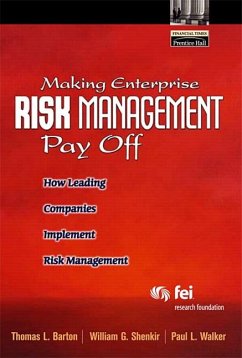Making Enterprise Risk Management Pay Off shows how top companies are transforming risk management into an integrated, continuous, broadly focused discipline that identifies and assesses risks more effectively, responds more precisely, and discovers not just "downsides" but breakthrough opportunities as well. Through five wide-ranging case studies - Chase Manhattan, Microsoft, DuPont, Unocal, and United Grain Growers - you'll learn powerful new risk management techniques that span the entire enterprise, and deliver unprecedented business value.
Dieser Download kann aus rechtlichen Gründen nur mit Rechnungsadresse in A, B, BG, CY, CZ, D, DK, EW, E, FIN, F, GR, HR, H, IRL, I, LT, L, LR, M, NL, PL, P, R, S, SLO, SK ausgeliefert werden.


